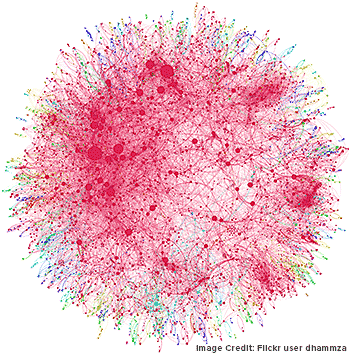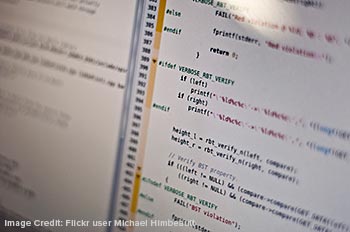Future Now
The IFTF Blog
The Race to Build the Machine
Why Self-Driving Companies will Push Well Beyond Today’s Labor Platforms to Define the Future of Work
While Uber, Airbnb and the other players in the “sharing economy” have captured public attention, the technologies underlying them continue to evolve at a rapid pace and it would be a mistake to think about the future of work in terms of “uberization.” The future direction of these technologies is highlighted by work IFTF has undertaken in collaboration with Rethinkery Labs, a spin-out venture focused on building software-defined organizational systems, to take many of these shifts to their natural conclusion: the self-driving company.
Hail an Uber. Launch a Kickstarter. Stay in an Airbnb. It’s become today’s new lexicon, much like “Googling” something became the norm just a decade ago. The difference with platforms like Uber, Kickstarter and Airbnb, though, is they are redefining what it means to work.
 Thought-leaders, policymakers and CEOs alike are trying to wrap their heads around how these technologies will affect the future of work. Attention is primarily focused on the pluses and minuses of working through these platforms. On the upside, these platforms allow people to be entrepreneurial, work their own hours and access a variety of work or part-time income. On the other hand, these platforms are replacing traditional work environments that may offer stronger workplace protections, benefits and income predictability.
Thought-leaders, policymakers and CEOs alike are trying to wrap their heads around how these technologies will affect the future of work. Attention is primarily focused on the pluses and minuses of working through these platforms. On the upside, these platforms allow people to be entrepreneurial, work their own hours and access a variety of work or part-time income. On the other hand, these platforms are replacing traditional work environments that may offer stronger workplace protections, benefits and income predictability.
Yet while the implications of such platforms are being discussed, the platforms themselves are evolving rapidly. The disruptions these ventures have caused today pale in comparison to the technological disruptions around the corner.
Indeed, the root of the current algae-boom of coordination platforms is just the next evolution of organization codification that goes back thousands of years.
Consider this: legal partnerships and futures contracts became standard practice nearly four thousand years ago when ancient Sumerians realized they needed a way to codify business arrangements. Three thousand years later, trade guilds emerged to codify vocations. Two hundred years ago, the modern limited-liability corporate structure began to take shape, along with the highly bureaucratic systems to manage them.
Let’s not forget the impact assembly lines had on the economy a century ago, a system used to formally codify the production process. And in the mid-1900s, business operations became so well codified that it led to the proliferation of franchises that could carry the corporate structure while operating as an individual entity.
Meanwhile, advances in technology have spread deep-rooted fears that software, robots and the like will begin to replace the role of human employees. With its illustration of computer-driven technological unemployment, the Katherine Hepburn and Spencer Tracy film Desk Set acknowledges this fear as far back as 1957. Today, software is becoming the key force for organizing work. The Hong Kong subway system, for example, relies on software to manage and coordinate thousands of repair workers. The venture capital firm Deep Knowledge Ventures has named a software system to its corporate board.
 Here’s what it looks like: we are developing software that allows tasks, even entire positions, to be broken down into a series of smaller tasks based upon a proven formula or work product “recipe”. The software then leverages existing platforms like Upwork (formerly oDesk), Task Rabbit, Uber etc. to find a team of qualified individuals to complete each of those tasks. One of the tasks may even be coordinating the other tasks, or finding the freelancers to coordinate the other tasks. Work products are broken down into smaller pieces and then ultimately unified to create a cohesive final product.
Here’s what it looks like: we are developing software that allows tasks, even entire positions, to be broken down into a series of smaller tasks based upon a proven formula or work product “recipe”. The software then leverages existing platforms like Upwork (formerly oDesk), Task Rabbit, Uber etc. to find a team of qualified individuals to complete each of those tasks. One of the tasks may even be coordinating the other tasks, or finding the freelancers to coordinate the other tasks. Work products are broken down into smaller pieces and then ultimately unified to create a cohesive final product.
Recipes will take some time to establish, but once they are built, the process will be much more efficient than having an individual micro-manage the entire process. Think of it as an assembly line for knowledge work and service positions—a smooth process that creates abundant opportunities for on-demand work.
We know this based upon our own experience to date. IFTF has tested the concept already. Our experimental work in this space was featured in the Harvard Business Review earlier this year. The Gartner Group has since gone as far as predicting that by 2018 more than 3 million workers will be supervised by a “robo-boss.”
Now, technological advances have put us on the brink of moving to fully autonomous organizations, or what we at the Institute for the Future (IFTF) have dubbed “self-driving organizations.” At this point, we are beginning to experiment with features like ‘self-replication.’ Just imagine what happens when software is not only able to manage work processes, but can also go on to automatically hire and manage a sales team to build a market for these creations. We sometimes compare it to the scene in the Disney cartoon ‘The Sorcerer’s Apprentice’ where the brooms that have been tasked to do work start multiplying.
Along those lines, IFTF is working in partnership with Rethinkery Labs, which was spun out of IFTF, to build and explore technologies in this space. Early “self-driving companies” could very well reach widespread deployment before self-driving cars do.
 If policymakers thought platforms like Uber, Task Rabbit and Airbnb presented challenges—just imagine the challenges that lie just ahead. As we try to understand the “future of work” in today’s environment, underlying software systems are evolving even more rapidly. We’ve only just scratched the surface.
If policymakers thought platforms like Uber, Task Rabbit and Airbnb presented challenges—just imagine the challenges that lie just ahead. As we try to understand the “future of work” in today’s environment, underlying software systems are evolving even more rapidly. We’ve only just scratched the surface.
The challenges posed by the sharing economy are all true, and more is needed to understand the broader implications—particularly for low income workers who, if displaced by technology, have fewer options. At the same time, the digital codification of organizational processes presents unique opportunities as well. In today’s world, people in the sharing economy are routinely competing for work with others on the platform. In the not-too-distant-future, software programs will be competing for people instead. It will limit the time-consuming pitches, outreach and business development activities; time that can be redirected into actual work that earns them money.
Recall that it was only 200 years ago that corporate structures formed to maximize scale and reduce transaction costs. Corporations in and of themselves were considered a novel innovation at that time. But the corporate structure was founded on the predicate of 18th century technologies, which have since rapidly evolved. It should be no surprise, then, that as technologies evolve, so too will corporate structures.
Though it’s too early to fully play out the ways that these technologies will impact the future of work for generations to come, one thing is for certain: it won’t take a generation for impacts to be felt. Changes are happening right before our eyes. The more quickly we identify and implement policy changes, the more adept we will be at utilizing these new technologies for the benefit of all.
As we grapple with the future of an on-demand global workforce, all of us—from platform designers to urban leaders, from policy makers to educators and corporations—![]() need to engage in envisioning positive platforms that ensure a workable future for everyone. IFTF's Workable Futures Initiative is a call-to-action to rethink the future of work through on-the-ground research, a reformulation of labor economics, prototyping of positive platforms, and broad public engagement. To learn more about the Workable Futures Initiative, please contact Program Manager, Libby Reder.
need to engage in envisioning positive platforms that ensure a workable future for everyone. IFTF's Workable Futures Initiative is a call-to-action to rethink the future of work through on-the-ground research, a reformulation of labor economics, prototyping of positive platforms, and broad public engagement. To learn more about the Workable Futures Initiative, please contact Program Manager, Libby Reder.



